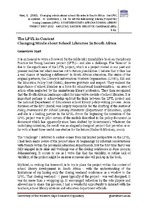The LPYL in context: changing minds about school libraries in South Africa
Abstract
It is an honour to write a foreword for the Bibliotek I Samehälle's book on the Library
Practice for Young Learners project (LPYL) - and also a challenge. The "honour" is
due to the significance of the LPYL project, which is a project rooted in our past and
present realities but which reaches out to future possibilities. I believe that it thus has
a real chance of "making a difference" to South African education. The vision of the
original partners, the Library & information Workers Organisation (LIWO), BIS and
the Education Policy Unit (Natal), deserves gratitude and respect. They realised the
importance of school libraries as a force for educational transformation - an area of
action often neglected by the mainstream library profession. They then recognised
that the South African landscape called for innovative models of school libraries. It is
important perhaps to acknowledge upfront the links between the LPYL project and
the national Department of Education's school library policy-writing process. Jenni
Karlsson of the EPU (Natal) was largely responsible for the drafting of the National
Policy Framework for School Library Standards (Department of Education, 1998)
and she is a leading partner in the LPYL. From the beginning the intention of the
LPYL project was to pilot certain of the models described in the policy document (a
document which has apparently since been shelved by Government). Whatever the
underlying intention, the result was an elegantly-designed project that provides us so
far with at least three useful case studies for the future (Naiker & Mbokazi, 2002).

